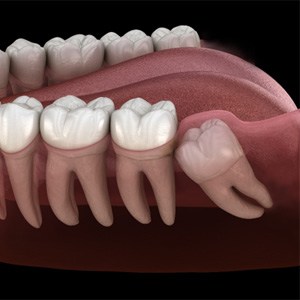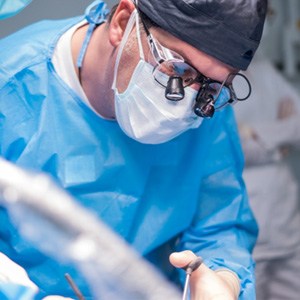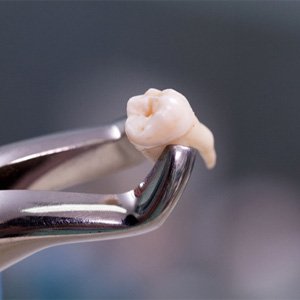


We as humans are evolving past the need for wisdom teeth. Most of us do not seem to have enough room in the jaw for a third set of molars, which causes them to become stuck while erupting, or impacted. At Advanced Dentistry of Alhambra, patients can get the care they need without having to leave the comfort of their dental home. If you or your teen are experiencing issues related the wisdom teeth, don’t hesitate to give us a call to discuss wisdom tooth extractions in Alhambra, CA.


Wisdom teeth are the third molars and the last adult teeth to erupt in the mouth. Most people have four wisdom teeth – two on the top and two on the bottom. Anthropologists believe that wisdom teeth were once especially helpful for our prehistoric ancestors who needed additional chewing power to grind through rough plants, seeds, nuts, and foliage that made up the majority of their diets. As teeth would fall out over time, wisdom teeth could step in and act as replacement teeth as well. Now that we have a softer diet filled with carbohydrates and high-calorie foods, as well as a focus on dental care, wisdom teeth aren’t usually needed anymore. People can be born with none, one, two, three, or four wisdom teeth, and they don’t always need to be removed. It all depends on your individual smile.

Wisdom teeth are not necessarily a problem. However, there are a number of issues that can arise from impacted wisdom teeth. When left untreated, impactive wisdom teeth can lead to a variety of problems. This includes:

Once we have examined a patient and determined that their wisdom teeth need to come out, the procedure starts with us thoroughly numbing their mouth. To remove wisdom teeth that have already erupted, dental forceps and an elevator will be used. However, if the wisdom teeth have to be removed before they have fully erupted, we have to make a small incision in the nearby gum tissue before we can extract the teeth themselves. After doing so and suturing the treatment area(s) closed, most patients are able to fully recover and feel completely normal in less than a week.

After your procedure, it’s common to experience some bleeding, swelling, bruising, and discomfort, but this should subside over the next few days. During this time, it’s especially crucial to maintain an excellent oral hygiene routine. This includes rinsing and brushing gently while avoiding the extraction site. Stick to softer foods and don’t use a straw when you drink. Take all prescribed and over-the-counter medications as directed. If you have any questions or concerns, give us a call. This way, we can give you specific guidance to meet your needs.

Are you going to try wisdom tooth extractions in Alhambra? If so, you’ve made a wise choice – removing your third molars will do your oral health some good. However, learning more about this option would still be good first. You might not feel confident in your upcoming treatment otherwise. That said, Advanced Dentistry of Alhambra can assist: listed below are answers to some oft-asked questions regarding wisdom tooth removal. If possible, read them over a bit and learn what extraction entails. For any other details you’d like, just call our office .
Technically, there isn’t a specific age at which a person’s wisdom teeth should be removed. That said, most dentists recommend the extraction when a patient is in early adulthood. This timing makes the procedure and subsequent recovery easier.
You see, the roots of wisdom teeth grow longer as a person ages. The result is that these extra pearly whites get more embedded in the jaw. In such cases, extraction is complicated and takes longer to heal from.
To reduce complication risks, then, a dentist usually suggests wisdom tooth removal sooner rather than later. The alternative is a higher chance of impaction, decay, cysts, and other oral damage.
Yes, actually – the teeth should be removed even if they don’t hurt. Though they might not cause discomfort now, failing to remove them could cause future problems.
Often enough, said problems are severe. Wisdom teeth, for example, can trap food debris and bacteria, triggering infections and tooth decay. Similarly, those not removed soon enough might develop cysts that damage the surrounding teeth, gums, and jawbone.
Despite these facts, though, extraction should only be done if a dentist recommends it. Therefore, don’t book the treatment unless a qualified professional approves.
After a wisdom tooth removal, wait at least an hour (or two) before eating. Doing so gives your mouth time to heal the treated area and slow down residual bleeding. This approach may leave you a bit hungry, but following these instructions benefits you overall.
For starters, remember that your mouth will still be numb right after treatment. A meal in that condition might lead you to bite your tongue, lip, or cheek. You’d then suffer damage or discomfort without even realizing it.
From the second day post-treatment onward, the dentist will instruct you to eat soft foods for a while. Once you’ve done so for about a week, you can gradually add heartier foods to your diet as needed.
If you don’t already know, a blood clot should form over the extraction site after a wisdom tooth is pulled. This clot protects underlying bone and nerves from a stimulus, thus promoting faster healing. Without it, meanwhile, you’ll develop a dry socket that exposes sensitive mouth bits.
Once the extraction is over, the dentist will instruct you on preserving blood clots and preventing dry sockets. A tip they may suggest is to avoid smoking, as tobacco can disrupt recovery. On the other hand, they may tell you not to drink through a straw or blow your nose. Those actions would dislodge the blood clot.